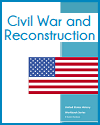| War, Prosperity, & Depression—U.S. History Workbook |
|---|
| United States History ↣ American History Workbooks ↣ U.S. History Workbooks for High School |
|
This particular workbook covers the First World War, Woodrow Wilson, Lusitania, General John J. Pershing, Fourteen Points, Treaty of Versailles, League of Nations, Russian Revolution, Attorney General A. Mitchell Palmer, Red Scare, 19th Amendment, Warren G. Harding, Fordney-McCumber Tariff (1922), Andrew Mellon, Calvin Coolidge, "new" immigrants, Johnson-Reed National Origins Act (1924), and much more. This free PDF high school American History workbook is 17 pages in length. The answer key is below. Click here to print. |
 |
    |
|
1 War and Neutral Rights 1. Germany and Austria-Hungary against Britain, France, and Russia 2. Submarine 3. May 7, 1915 4. Woodrow Wilson 2 United States Enters World War I 1. Resumed unrestricted submarine warfare 2. General John J. Pershing 3. C - Establishment of a totalitarian regime in Germany 4. November 11, 1918 3 The League of Nations 1. B - false 2. Wilson had failed to involve leading Republicans in the treaty negotiations; while on a national tour to appeal for support, he suffered a crippling stroke from which he never fully recovered 3. B - false 4 Postwar Unrest 1. B - false 2. A - Bolsheviks 3. Attorney General A. Mitchell Palmer 4. Answers will vary 5 The Booming 1920s 1. D - Warren G. Harding 2. Suffrage (right to vote) for women 3. Brought American trade barriers to new heights, guaranteeing U.S. manufacturers a monopoly of the domestic market, but blocking a healthy trade with Europe that would have reinvigorated the international economy; contributed to a collapsing cycle of world trade that intensified world economic misery 4. Andrew Mellon 5. Calvin Coolidge 6. Transportation Act of 1920 restored the railroads to private management; Merchant Marine was sold to private operators 7. Loss of foreign markets due to U.S. tariff policy and worldwide phenomenon of excess farm production 8. Answers will vary 6 Tensions over Immigration 1. Russian Jews, Poles, Slavic peoples, Greeks, and southern Italians; non-Protestant, "non-Nordic," and, many Americans feared, nonassimilable 2. Wanted to send them back to Europe 3. Established an immigration quota for each nationality 7 Clash of Cultures 1. William Jennings Bryan 2. Clarence Darrow 3. Prohibited the manufacture, sale, or transportation of alcoholic beverages 4. Speakeasies 5. Bootlegging 6. C - 1933 7. H.L. Mencken 8. F. Scott Fitzgerald 9. Sinclair Lewis 10. Ernest Hemingway 11. National Association for the Advancement of Colored People (NAACP) 12. African-American literary and artistic movement of the 1920s 13. D - Michael Buble 8 The Great Depression 1. The booming stock market crashed, wiping out many investors 2. D - 20% 3. Attempted to organize business, had sped up public works schedules, established the Reconstruction Finance Corporation to support businesses and financial institutions, and had secured from a reluctant Congress an agency to underwrite home mortgages 4. A - Franklin D. Roosevelt 5. Answers will vary |
| United States History ↣ American History Workbooks ↣ U.S. History Workbooks for High School |








